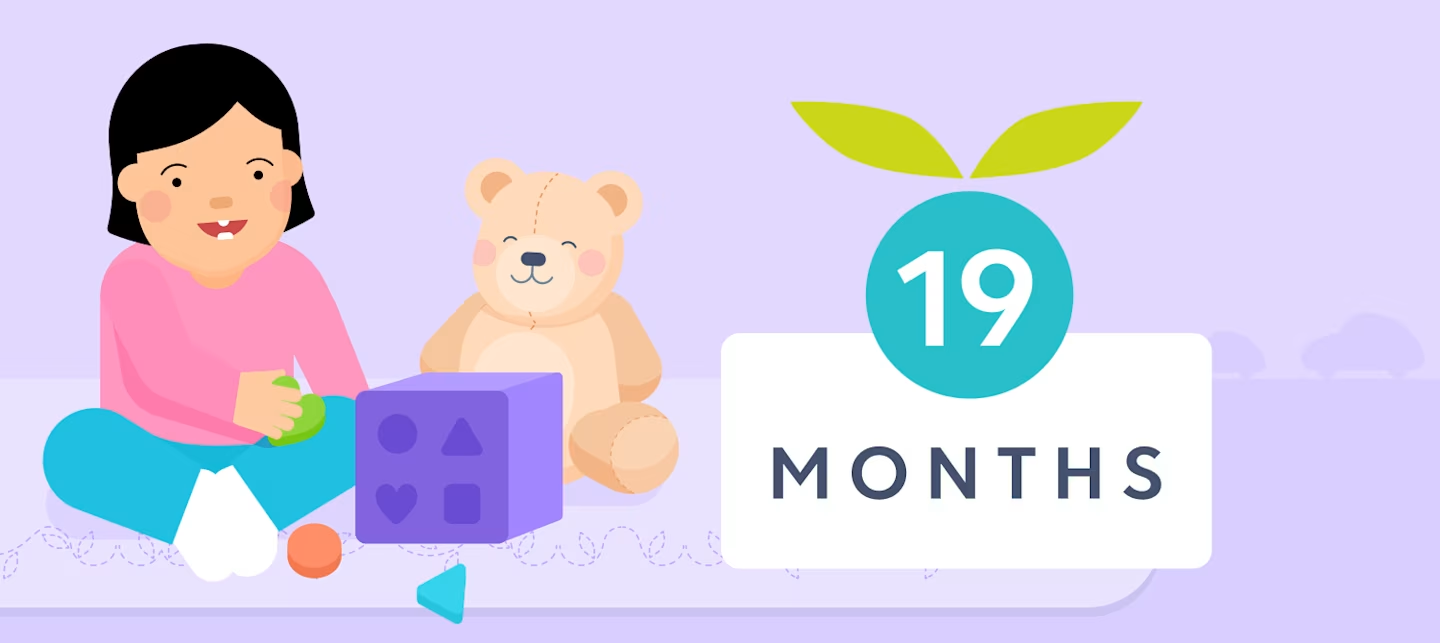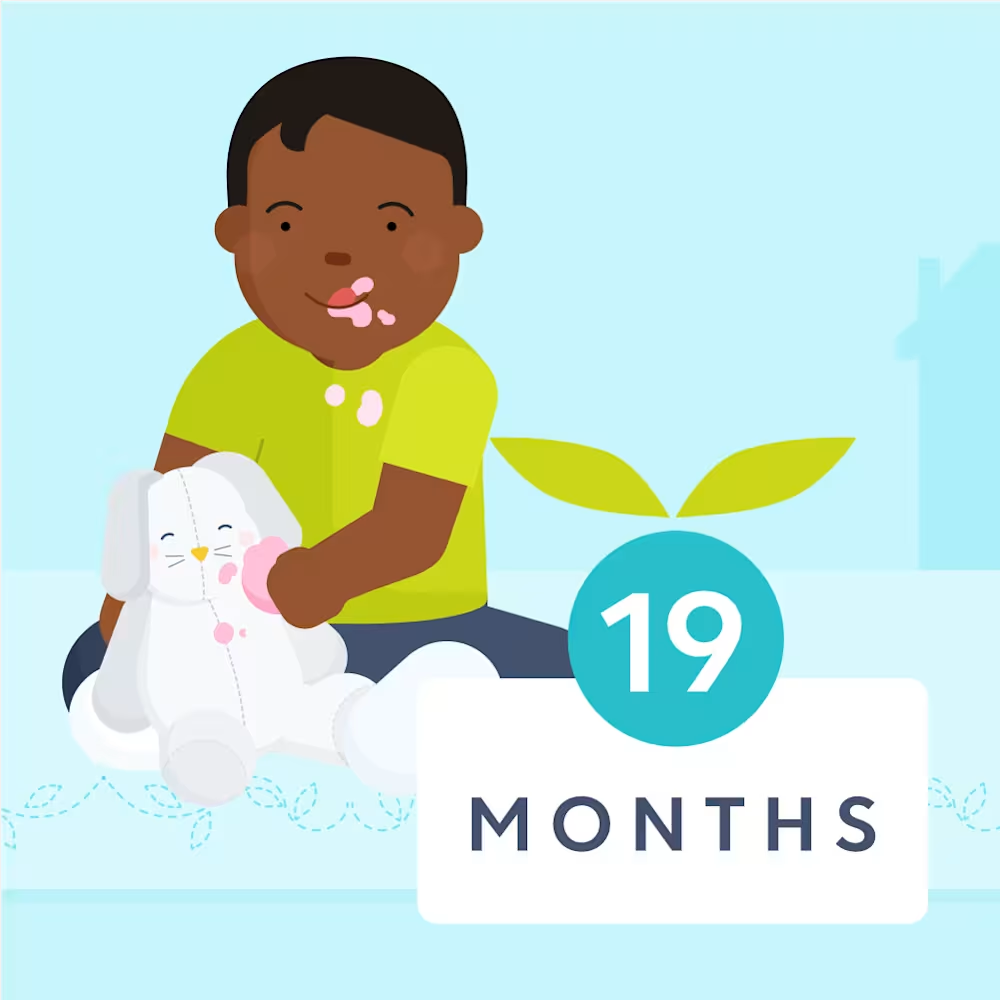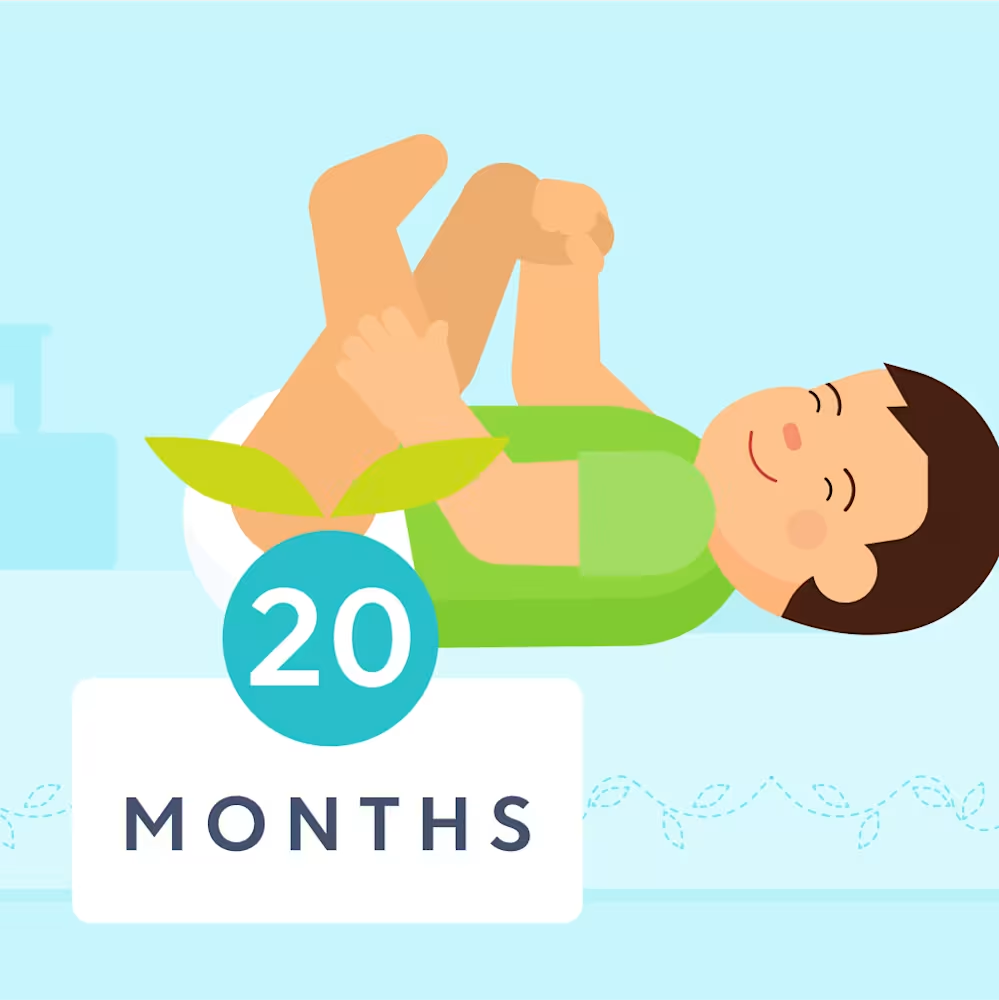19 month old toddler milestones: Development, growth, speech, language
Updated Dec 29, 2025

At 19 months, your toddler is officially closer to their second birthday than their first. Let that digest for a moment! It may feel like time is flying by, especially with all your little one is up to these days. At this age, your 19 month old is likely working on a range of new milestones from speech and language development to emotional and fine motor development. They may be turning into a pro at climbing stairs, adding more words to their vocabulary (and starting to put them together!), or even learning how to run. In this article, we’ll take you through the milestones you can expect from 19 - 20 months, give you a handy 19 month old development checklist, and provide useful tips to support your little one’s growth.
19 month old baby milestones at a glance
At a year and seven months, it may feel like your toddler is gaining new skills every day.
Development:
Your 19 month old is filled with emotions and is learning how to better express those big feelings more effectively — and cope with them when things don’t go their way. Toddlers this age are working on expanding their vocabulary (some may say 50 - 100 words [] by their second birthday). They’re also using those nimble little fingers more to learn about the world around them — from turning pages on their own and flipping switches [] to figuring out how buttons and gears work.
Sleep:
Continue to aim for about per day (11 - 12 hours at night and 2 - 3 hours of day sleep). Most 19 month olds have transitioned to 1 daily nap and need 5 - 5.75 hours of awake time between sleep periods. Many children experience bumpy sleep around 18 - 19 months, as they go through developmental milestones and the 2 to 1 nap transition. This sudden period of challenging sleep is often called the “.” However, not all toddlers will experience new sleep issues at this age. .
Just remember that every child is different and their sleep needs may vary. The recommended hours are a rough guide, so don’t stress trying to hit the exact sleep hour goals. Instead, pay attention to your little one’s mood and energy levels when evaluating if they’re getting enough rest.
Feeding:
Most 19 month olds need around 1,000 calories per day [], typically divided into three meals and two snacks. Don’t be alarmed if you have a on your hands (it’s common at this age!). Continue offering a variety of new foods (with plenty of fat) along with familiar, well-liked options []. Let them experiment with a range of tastes and textures, without worrying about how much they’re actually eating. However, if you have concerns or notice any red flags (e.g. significant growth concerns or texture aversion) when it comes to your child’s eating, consult their healthcare provider.
19 month developmental milestones
Physical development at 19 months
As your toddler approaches 19 - 20 months, this time is filled with exciting new developmental milestones.
Gross motor milestones
By 19 months, most toddlers walk independently and are working on related milestones. For example, they may be climbing up steps, getting on and off furniture by themselves, or starting to stand on tiptoes. Toddlers typically learn how to run and kick a ball between 19 - 24 months.
Don’t worry if your little one isn’t sprinting at 19 months — there’s a wide range of normal when it comes to milestones. However, check in with your child’s healthcare provider if they’re not taking independent steps by 18 months [].
Fine motor milestones
You may have a budding artist at 19 months who can hold crayons with their fingertips and thumb [] and scribble spontaneously. Or a mini architect who can build towers with four or more blocks. At this age, you may notice your toddler starting to use one hand more frequently than the other or have a clear preference []. They’ll also be working on being able to manipulate small objects [] like gears [], buttons, and doorknobs.
Speech, language, and communication development at 19 months
Language skills: Your 19 month old is likely saying simple words and phrases while building a 50+ word vocabulary [2]. They may be starting to combine them into 2 - 4 word sentences []. But be careful what you say around them — this is the age where your little chatterbox may start repeating words [] they overhear.
During this time, they’re likely rapidly learning new words — even if they can’t say them just yet. Between 18 - 24 months, toddlers typically go through a period of “” [] and can comprehend more words than they speak for a while.
Pointing to communicate: By 19 months, toddlers tend to use their hands (and pointer finger) to communicate while building their vocabularies. At this age, your little one may be able to point to things in a book or picture (for example, if you ask, “Can you find the monkey?”). They may also be able to point to one or two body parts [] when asked. Gestures: Your little one’s pointer finger isn’t the only one getting a workout as they near their second birthday. Many 19 month olds are starting to use more gestures [] to communicate in addition to pointing and waving. They may be blowing kisses or nodding their heads to say, “Yes!”
Social and emotional development at 19 months
Working on empathy: At this age, many 19 month olds are starting to work on empathy [] and noticing the feelings of those around them. They may recognize when someone is hurt or upset and stop or look sad if they see someone crying.
Look for your lead: By 19 months, your little one is likely mimicking your behaviors and words. But now, they may start turning towards you to check in emotionally. Before reacting to new situations, your toddler may stop to look at your face first to see how you feel (and how they should feel) about things. Expanding social interactions: Many 19 month olds are working on playing with others and are increasingly excited []about seeing other kiddos. At this age, toddlers may be able to participate in playing in small groups with other kiddos. They may also be more aware and interested in maintaining eye contact with others.
Quiet play: Toddlers this age are typically on the move but learning to appreciate taking time to sit and look at or listen to books as they near their second birthday. By this age, they typically can turn the pages of a book on their own and start playing with toys more without mouthing them.
19 month milestone checklist
Below is a general checklist of milestones that some babies will start to reach by 19 months. Keep in mind all toddlers are unique, and there's a spectrum of normal milestones at 19 months. However, if you are concerned about your child’s growth or developmental delays, contact their healthcare provider.
Milestones to watch for at 19 months:
Uses simple phrases () []
Starts to jump with both feet leaving the ground
Runs
Stands on tiptoes
Climbs on low furniture
Kicks large ball
Goes up and down stairs (with support)
Flips switches on and off
Scribbles
Sorts shapes and colors
Stacks 4+ or more small blocks or toys
Takes toys apart and puts them back together
Uses at least 50 words (19 - 21 months)
Consistently imitates new words (19 - 21 months)
Understands simple pronouns (me, you, my) (19 - 21 months)
Identifies 1 - 2 body parts when named []
Locates objects you’re pointing to
Eats with a spoon (19-24 months)
Holds something in one hand while using the other hand (19-24 months)
Tries to flip switches, turn knobs, and press buttons (19-24 months)
Plays with more than one toy at the same time (19-24 months)
What are 19 month development red flags?
It's normal if your 19 month old is still working on some milestones — everyone develops at their own pace. However, here are some instances where reaching out to a pediatrician can help determine if there's an underlying issue worth exploring. Let your healthcare provider know if your child []:
Doesn’t use gestures to show or share things with others
Unable to walk
Doesn’t understand the purpose of familiar objects, like a comb, spoon, or cup
Doesn’t imitate other people’s actions
Doesn’t learn new words
Doesn’t speak at least six words
Doesn’t react when a caregiver leaves or comes back
Loses previously acquired skills
Also contact your family's doctor if you have any other concerns or questions about your child's physical growth or development. Erring on the side of caution is always advisable, even if it's for your own peace of mind.
3 development tips for 19 months
Tip | Why it helps | What to try |
|---|---|---|
Keep mealtimes pressure-free | Appetite dips and picky phases are very common. Removing pressure helps toddlers listen to their own hunger cues and reduces power struggles. | Offer balanced options, keep the vibe relaxed, and let your toddler decide if and how much to eat. Trust that intake usually evens out over a few days. |
Use fingers for fun | Hands-on play builds fine motor skills, creativity, and early language as toddlers learn how actions connect with words. | Try finger painting, simple color-mixing, or “point and name” games to strengthen coordination and support vocabulary growth. |
Lean into routines | Predictable rhythms help toddlers feel secure, regulate emotions, and transition more smoothly between activities. | Keep daily routines consistent and straightforward. Use the same steps for common transitions, such as leaving the house, meals, or cleanup time. |
Find more details below:
Tip #1: Keep mealtimes pressure-free
You may have noticed your little one’s appetite decrease after their first birthday, or you might have a new picky eater on your hands — while frustrating, both are normal at this age. The mealtime struggle can feel real but try to keep things relaxed instead of pressuring them to eat. Pushing boundaries is also common at this age and food is often part of this power struggle. Eating is one of the first areas where toddlers feel they have control [] and many are eager to assert their power. Remember, their diet will likely balance out [] over a few days and forcing food [] may actually result in more in the long run.
Tip #2: Use fingers for fun
As your 19 month old works on their dexterity, you can use those little fingers for games that work on big skills. Break out the finger paint and let them mix colors and explore their creative thinking. Or play point games [] (where you point to objects and say their names) as your little one works on language and learning how objects and words relate.
Tip #3: Lean into routines
Many toddlers thrive on having predictable pre-sleep routines. But routines aren’t just for bedtime. At this age, doing the same simple routines and transitions throughout the day may help toddlers feel safe and more in control of their world. Daily routines may help toddlers cope with activity changes [], feel more secure, encourage self-control, and build positive behavior.
Activities for toddlers at 19 months
1. Involve your little helper in household tasks
At 19 months old, your toddler isn’t too young to lend a helping hand — even if they aren’t always actually that helpful. From working with you on meal prep [] and picking up toys to helping with dusting or sweeping, get your toddler in on some light chores around the house. Involving them in household tasks is a great way for them to work different muscle groups [], practice fine motor skills, and build confidence as well as independence. It also allows them to try mimicking what they see you do, follow simple instructions, and start learning responsibility.
2. Encourage independent play
Give your 19 month old opportunities for independent play [] — and then ask them about it afterward. Periods of solo time give toddlers the chance to learn more about themselves while working on problem-solving, building their creativity, boosting their confidence, exploring what they’re good at, and practicing self-regulation. Designate a specific space for them to safely play (where you can see and hear them). If they want you involved, join them in the beginning then try to slowly ease away (even if it's just for a few minutes). After solo play, celebrate their time by asking them to tell you about it. Not only does the recap work on boosting their vocabulary, but it also helps build up their sense of pride, confidence, and comfort with being alone for the next time.
Caring for a sick 19 month old
It's never fun when your little one is under the weather. Even a case of the sniffles can lead to sleep challenges and disrupt their energy and appetite. These strategies can help your child feel more comfortable and cared for while they're sick:
Keep them hydrated: Fluids are especially important when your toddler isn’t feeling well. Solid foods may be less appealing, which is normal. Offer frequent small sips of water or milk to help keep them hydrated.
Ease congestion: A stuffy nose can make eating and sleeping harder. A cool-mist humidifier, saline drops, and gentle suction can help clear nasal passages. Using these before naps and bedtime can make resting easier.
Monitor fevers: Contact your pediatrician if your child’s fever lasts longer than 24 hours or repeatedly goes above 104°F (40°C) []. If advised by their doctor, age-appropriate doses of children’s Tylenol or Motrin can be given. Avoid cough and cold medicines, as they aren’t safe for toddlers.
Be flexible with sleep: Illness often disrupts sleep routines. Your 19-month-old may nap more or less than usual, or wake frequently at night. Follow their cues and return to the regular schedule once they’re feeling better.
Offer extra comfort: Some toddlers need extra cuddles when sick, while others prefer a little space. Pay attention to their signals and respond in ways that help them feel secure. Caring for a sick toddler can be tiring for parents, so don’t hesitate to lean on your support system when needed.
Takeaway
19 month olds are learning how to express their big emotions and may be going through a “language explosion” while rapidly comprehending new words — even if they can’t speak them yet.
Toddlers at 19 months tend to have a more predictable sleep schedule with 1 nap, though nap transitions and developmental milestones may disrupt sleep at this age (commonly referred to as an “”).
As toddlers approach their second birthday, they typically need three meals and two snacks per day. However, it’s normal to see bouts of picky eating and/or an inconsistent appetite at this age.
Ways to encourage growth and development at 19 months include making mealtimes pressure-free, getting them involved in household activities, using fingers for fun, leaning into routines, and encouraging small windows of independent play.
Keep in mind there’s a wide range of what’s considered “normal” when it comes to 19 month milestones. Not all toddlers are on the same timeline and it's OK if your little one hasn’t mastered all of these skills yet. However, always listen to your gut and contact your child’s healthcare provider if you notice any concerns, developmental red flags, or delays.
Share article:
Note: The content on this site is for informational purposes only and should not replace medical advice from your doctor, pediatrician, or medical professional. If you have questions or concerns, you should contact a medical professional.
15 Sources
Share article:





